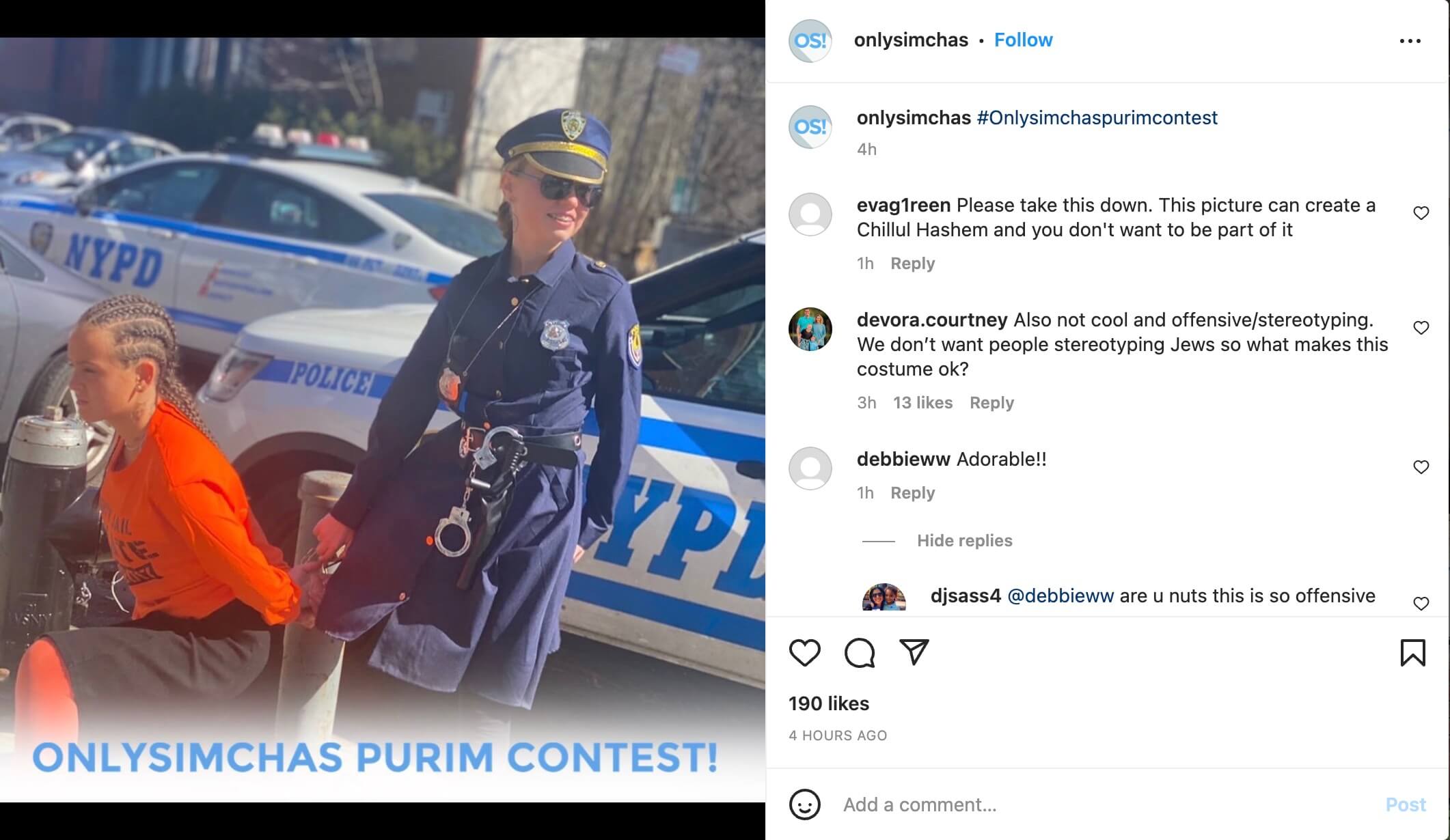A Purim costume spoofing police brutality triggers concerns about racism and insensitivity

The Instagram post in question, which was removed after the Forward reached out for comment. Courtesy of Instagram
The content on the OnlySimchas website and Instagram page is usually innocuous and cheerful. As the name suggests — simcha means happiness in Hebrew — the site posts photos and announcements of Jewish celebratory occasions, like engagements, submitted by users hoping to share their news with the wider Jewish world, along with a selection of ads selling products and trips targeted to Orthodox Jews.
But on Wednesday, as OnlySimchas posted dozens of user-submitted pictures of costumes to its Instagram page for a Purim costume contest, something less savory popped up: a photo of two girls dressed as a cop and prisoner, one in a skirted police uniform and the other in an orange T-shirt and leggings with her hair in cornrows.
Many of the comments under the picture condemned it as racist, offensive and a chillul Hashem, or a desecration of the name of God; they demanded that OnlySimchas take the photo down. But the submission also had over nearly 300 likes and a few comments defending the costume, such as one calling it “adorable.”
OnlySimchas responded to a request for comment on Wednesday afternoon and said the photo had been removed. “We are very upset about what happened — it completely slipped through our system,” read a direct message from the site’s Instagram account. Posting to Instagram, even through an automated scheduler, requires a human to upload photos; in response to further questions about their system and its human oversight, they replied, “Obviously our system was not good enough.” The message also condemned the incident as “terrible pranks” and added, “The whole goal of OnlySimchas has been and continues to be to promote goodness and happiness.”
The incident concerned members of the Jewish community, who argued in the post’s comments that an offensive costume is a dangerous representation of Jewry, particularly the Orthodox. One woman wrote that the photo needed to be taken down before it becomes “like last year in Lakewood.”
She was likely referring to the widespread media coverage of a 2021 incident, in which members of the Haredi community in Lakewood, New Jersey, wore costumes including blackface, wigs and Black Lives Matter sweatshirts. The event spurred the local NAACP chapter to request a meeting with the community’s leadership, and resulted in a statement from the community’s Vaad, or rabbinical association, apologizing.
The Lakewood incident was one of several incidents of Purim blackface documented over the years in the Orthodox community and in Israel.
Some representatives from the Orthodox community explain the phenomenon as the innocent result of living in an insular community, unaware of the history of minstrelsy and anti-Black racism. But others stick to their guns even when the racism is explained and condemned. In 2013, New York State Assemblyman Dov Hikind dressed as a “Black basketball player,” including a jersey, blackface an afro wig; he initially refused to apologize, defending the practice as in keeping with the Purim tradition of cutting loose and calling criticism “political correctness to the absurd.” (Hikind eventually apologized after condemnation from the Anti-Defamation League and fellow New York Orthodox politician Simcha Felder.)
But unlike some of the blackface incidents, whose participants have claimed naiveté, the costume on OnlySimchas references the current discourse around race and police brutality.
This was not the only controversial costume on the OnlySimchas page this year — another post features someone dressed as the QAnon Shaman from the Jan. 6 attack on the Capitol, complete with white supremacist symbols, which a few commenters also condemned.
But people were most concerned about the police picture. “We don’t want people stereotyping Jews so what makes this costume OK?” wrote one commenter.
I hope you appreciated this article. Before you go, I’d like to ask you to please support the Forward’s award-winning, nonprofit journalism during this critical time.
Now more than ever, American Jews need independent news they can trust, with reporting driven by truth, not ideology. We serve you, not any ideological agenda.
At a time when other newsrooms are closing or cutting back, the Forward has removed its paywall and invested additional resources to report on the ground from Israel and around the U.S. on the impact of the war, rising antisemitism and the protests on college campuses.
Readers like you make it all possible. Support our work by becoming a Forward Member and connect with our journalism and your community.
Make a gift of any size and become a Forward member today. You’ll support our mission to tell the American Jewish story fully and fairly.
— Rachel Fishman Feddersen, Publisher and CEO
Join our mission to tell the Jewish story fully and fairly.